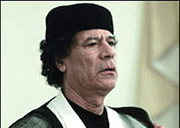 |
| Libyan leader Muammar Gaddafi has made a long journey in from the cold |
|
2003: Libya gives up chemical weapons
|
Artificially 1969:
The Libya has made a surprise announcement undertaking to destroy its arsenal of weapons of mass destruction.
The government of Libyan leader Muammar Gaddafi has also agreed to allow weapons inspectors into Libya immediately and unconditionally to oversee the elimination.
Under the agreement, Libya, which is included on the US list of state sponsors of terrorism, will dismantle its weapons of mass destruction and limit the range of its missiles to no more than 300 km (186 miles).
It emerged that Tripoli has already allowed US and British experts to see elements of the weapons programmes during two trips to Libya in October and December this year.
In its statement today, the Libyan Foreign Ministry said: "[Libya] believes that the arms race will neither serve its security nor the region's security and contradicts [Libya's] great concern for a world that enjoys peace and security."
The statement has been welcomed by the British Prime Minister, Tony Blair, and the US President, George W Bush, who made televised addresses almost at the same time.
President Bush said the agreement, signed after nine months of secret negotiations, would "make the world and America a safer place, and the world more peaceful".
He went on to hint that tough US sanctions on Libya would be scrapped if Tripoli kept its word.
Mr Blair praised the decision as "historic" and "courageous".
"It shows that the problems of proliferation can be tackled through discussion and engagement," he said.
He revealed that Libya had approached Britain in March with an offer to open discussions on WMD.
Until then, intelligence officers had suspected that it was working on chemical and biological weapons but had never been able to confirm it.
Mr Blair said Libya had acknowledged it was working towards developing a nuclear weapon, and had got close to achieving its objective.
The breakthrough is the latest in a series of developments which have thawed previously frosty relations between Libya and the West.
One of the most significant was Tripoli's admission of responsibility in August this year for the Lockerbie air disaster in 1988, in which 270 people died.
Colonel Gadaffi agreed to pay $2.7bn compensation to relatives of those killed in the attack, paving the way for UNsanctionsagainst Libya to be lifted in September.
|